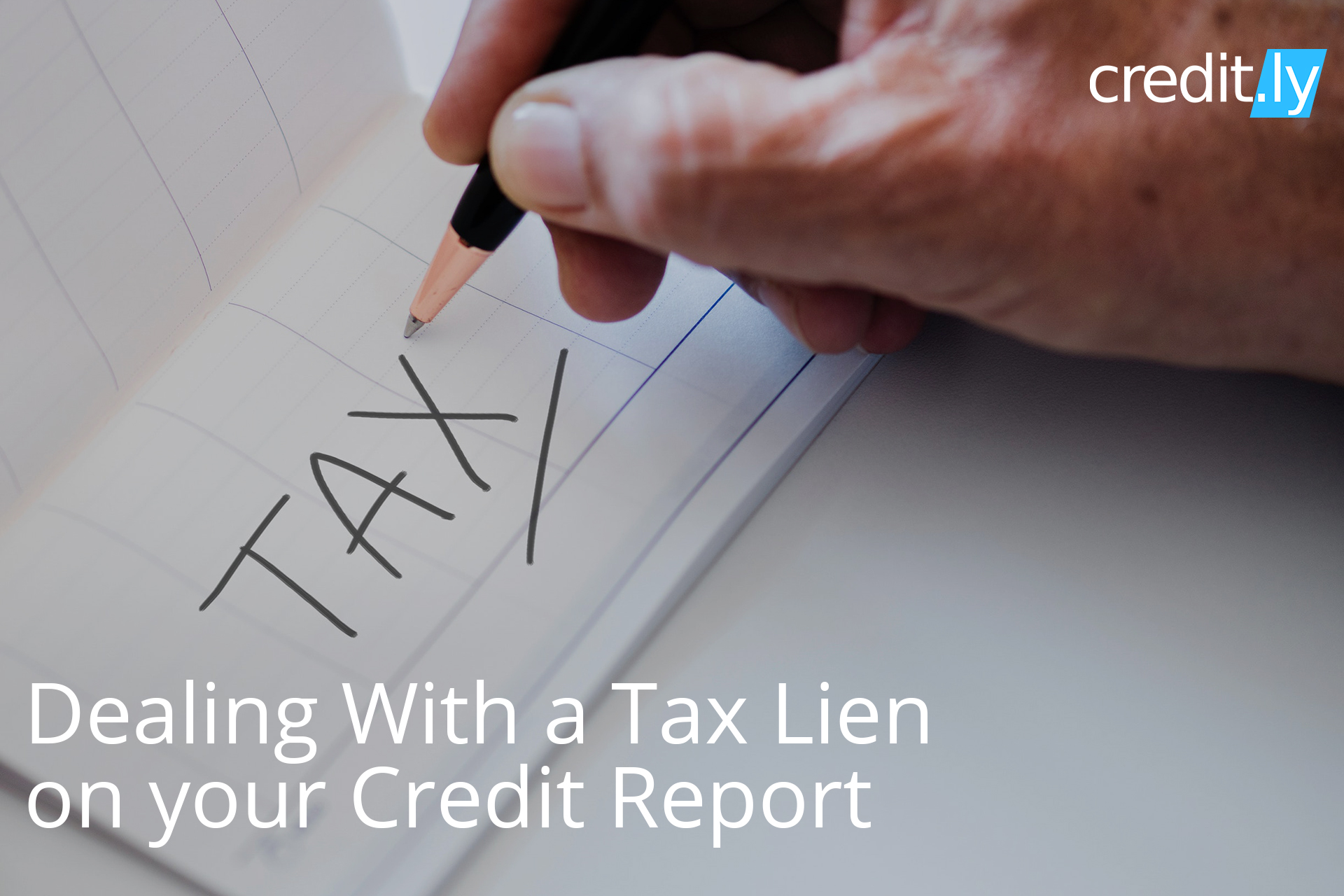Dealing With a Tax Lien on your Credit Report. Taxes and Death – The only things in life that you can rely on. Many people have been in a position unable to pay their taxes at some point in the past. Fear not, even if this has occurred to you, resolutions can be found. You may have been hit with a tax lien by the IRS and not even know it!
First, what exactly is a tax lien?
A tax lien is essentially the government, IRS, putting a claim on some type of property you own when you fail to pay taxes owed. This doesn’t mean your property will be seized, it just means the taxing entity gets first right to your property over other creditors. It can have significant consequences on your credit since it becomes a public record and shows up on your credit reports.
For example
I once received a call from someone who had found two tax liens on his credit reports, both more than 10 years old. This was a surprise and needed to be taken care to avoid added fees and interest. He had never reviewed his credit reports before. And was surprised to see these items show up since he had been able to obtain mortgages and other loans without a problem. (Remember that you’re entitled to free copies of your annual credit reports, and it’s a good idea to check them routinely for accuracy. In between those annual checkups, you can review a free summary of your credit report on Credit.ly.)
Although he was confident he had taken care of the liens years ago, the caller wasn’t sure he still had his records to prove it. Looking for help to clean up his credit report, he called me, and I sent him to IRS Publication 594: The IRS Collection Process.
After we talked, his situation continued to nag at me, and I decided to investigate further. I wanted the straight scoop on how difficult it would be for him to get those tax liens off his credit reports and whether there were things he should watch out for.
To answer my questions about removing old tax liens from a credit report, I turned to Tampa tax attorney and IRS problem solver Darrin T. Mish. Here are some basics about tax liens, plus answers to the questions I asked Darrin about resolving tax liens and getting tax liens off credit reports:
Are state and federal tax liens the same thing?
Basically, yes. Bot federal and state taxing authorities can place a lien on your assets, either for unpaid property, income or other delinquent taxes.
Do tax liens affect your credit score?
Yes. Having a tax lien means the government has a legal right to your property. Legal right to your real estate, personal property, financial assets. Because you have failed to pay a tax debt. The tax lien appears on your credit report in the public records section. And it can have a seriously negative effect on your credit scores. This is similar to a bankruptcy or a judgment. And even worse, it means they can put your home into a tax sale …
What is a tax sale?
If you do not pay your property taxes and a tax lien is placed on your home: The taxing authority has the right to try to recoup the amount you owe by seizing your home and selling it. This is known as a tax sale. And all states have laws that allow local government entities to sell your home through the tax lien process. This is to collect your delinquent taxes.
When you pay or settle a tax debt, how long does it take the IRS to release the lien? What is the procedure for doing so?
The statute says that they have 30 days to release the tax lien. See Internal Revenue Code 6325. That’s how it’s supposed to work, but in reality they often overlook it and it doesn’t get done. If this happens, then a taxpayer can contact the Lien Desk by phone at (800) 913-6050 or by fax at (859) 669-3805.
If you look at a copy of an actual Form 668(Y)(c) Notice of Federal Tax Lien, you will notice a bold black box about halfway down the page on the left-hand side. It says that if the lien is not refiled by the refile date in column (e), then the lien is releasable on its face. That sounds complicated, but what it means is that if another lien wasn’t filed before the dates in column (e), then the lien is no longer enforceable. This sometimes complicates matters because the IRS is often reluctant to issue a release for an expired lien.
Does the IRS automatically notify the credit agencies that the lien has been released? If not, what do consumers need to do to make sure their credit files are updated?
When the Certificate of Release gets filed in the courthouse where the lien was originally filed: The major credit reporting agencies should pick up the release. A much better practice would be to order three official copies of the release. And proactively send them into the three credit bureaus. Equifax, Experian and TransUnion. It could take months or years for the bureaus to automatically pick up the release.
What if you find a tax lien on your credit reports and don’t recognize it as yours? How do you research it to find out if it is valid?
This is a much trickier question. What you would need to do is research the public records offices of every county that you have lived in since the issuance of the Federal Tax Lien. The official name for this records office varies by state. (Examples include the county clerk, clerk-recorder or recorder office.) Some states have most, if not all, of these records online, while others have none of them online.
What if you find an old tax lien on your credit report and aren’t sure you paid it? What is the procedure for investigating it with the IRS?
You can call the IRS to inquire. But this can sometimes exacerbate a problem that has long been dormant. The best way by far to investigate such a situation is to contact a tax professional. Someone who is well versed in handling tax controversy cases and have him or her file a Freedom of Information Act request. This is a very discreet way to inquire without setting the IRS collection machine loose on a taxpayer.
What if you find an old tax lien on your credit file, believe you paid it but don’t have records anymore? What is the procedure for investigating it with the IRS?
You will ultimately have to check with the IRS to see if the liability has been paid. It’s important to note that there is a 10-year statute of limitations for the collection of the tax. The 10-year clock begins to run from the assessment of the tax. And there are many exceptions to this rule. And circumstances that can cause the statute time to be extended. (Sometimes very significantly.) This is another situation that is best left to a professional to decipher.
How long should you expect the above to take?
Such an analysis should take 60 to 90 days. A lien release subsequent to a request: 30 to 90 days.
What can you do to expedite the process if you are in the process of getting a mortgage, for example?
You could contact the Office of the Taxpayer Advocate for your local area. See the IRS website at www.irs.gov for the phone number for your local area. The Taxpayer Advocate is an independent branch of the IRS whose job it is to fix bureaucratic snarls and delays. There is no charge for their services. Using the Taxpayer Advocate can be very advantageous. Most especially from the point of view that you get one person to help you instead of speaking to anyone who answers the phone.
Are there any tips you would offer to consumers who find tax liens on their credit files?
Be very cautious about contacting the IRS about tax liens that may pop up. You can wake the sleeping giant and really turn your financial life into a living hell. It’s best to get professional help unless you are sure that you have paid off the lien and it’s just a matter of getting a release to clear up that issue.
There are a couple more things worth pointing out. According to the Fair Credit Reporting Act, they can stay on your credit report for seven years from the date they are satisfied or paid. A few years ago the IRS developed its Fresh Start initiative that allows consumers who have paid certain tax liens. Or entered into an installment agreement to pay them. This is to request they be withdrawn and subsequently removed from their credit reports.
And the IRS can file a lien quickly, in as little as 10 days after you are notified that you owe taxes. So if you get a notice that you owe Uncle Sam money, resolve it quickly before you end up with serious damage to your credit report! If tax liens have already been filed, resolve them as quickly as you can.
[/et_pb_text][/et_pb_column][/et_pb_row][/et_pb_section]









